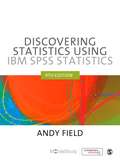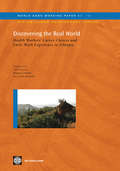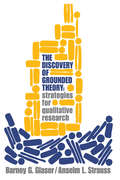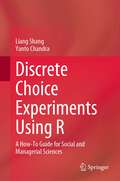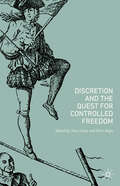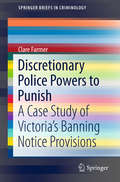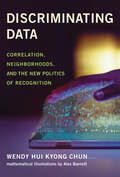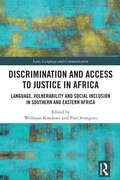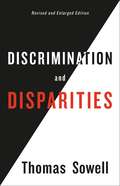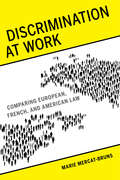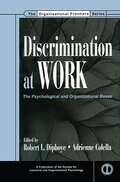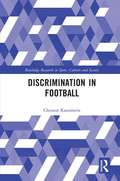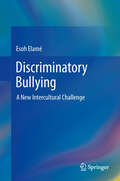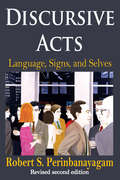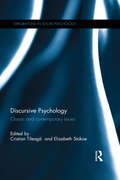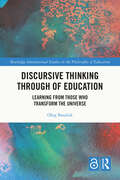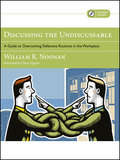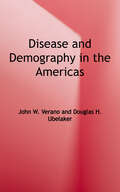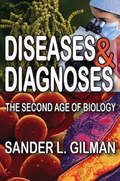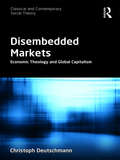- Table View
- List View
Discovering Statistics using IBM SPSS Statistics
by Andy FieldUnrivalled in the way it makes the teaching of statistics compelling and accessible to even the most anxious of students, the only statistics textbook you and your students will ever need just got better!<P><P> Andy Field's bestselling Discovering Statistics Using SPSS 4th Edition, already an immensely comprehensive textbook - taking students from first principles to advanced statistical concepts, and all the while grounding knowledge through the use of SPSS - now focuses on providing essential updates, better accessibility to its key features, more instructor resources and broader reach to new student groups - with powerful new digital developments on the textbook's companion website.<P> New to the 4th Edition<P> - New WebAssign® facility. If you adopt this for use on your course it will allow you to produce and manage assignments online with your students and includes a grading facility to monitor students' progress. Students can practise questions over and over and be provided with instant feedback and links to the accompanying Ebook where correct solutions can be found<P> - The mobile study facility encourages students equipped with smartphones and tablets to access revision material such as Cramming Sam's Study tips helping them to study when it suits them. QR codes in the textbook provide instant access<P> - Education and Sport Sciences instructor support materials with enhanced ones for Psychology, Business and Management and the Health sciences make the book even more relevant to a wider range of subjects across the social sciences and where statistics is taught to a cross-disciplinary audience.<P> Major Updates to the 4th Edition<P> - Fully compatible with recent SPSS releases up to and including version 21<P> - Exciting new characters. Statistical cult leader Oditi provides students with access to video clips to help further understanding of statistical/SPSS concepts, while Confusious helps students to make better sense of statistical terms<P> - An enhanced Companion Website offers plenty of lecturer and student material to use in conjunction with the textbook. These include PowerPoints and Testbanks for lecturers as well as answers to the Smart Alex tasks at the end of the each chapter; datafiles for testing problems in SPSS; flashcards of key concepts; self-assessment multiple-choice questions; and online videos of key statistical and SPSS procedures discussed in the textbook for students.
Discovering Statistics using IBM SPSS Statistics
by Andy FieldThe only statistics textbook you'll ever need just got even better! Students and practitioners of social science often look at mathematics and its allies with suspicion. This book attempts at moderating such a feeling in an interactive and humorous way. The time-tested approach and content serve students of undergraduate and postgraduate levels. With the help of real research examples, the book will take students as well as teachers on a wonderful journey covering both basic principles and advanced concepts and applications of statistics. This book can become your best friend if you want to understand and use statistics to conduct data analysis in the best possible way. Grab it and leave those anxious moments of overload of mind-boggling data behind! Key Features: The 4th edition comes with • A balanced blend of theory and practice of statistics • Updated versions of IBM SPSS Statistics (including version 21) • SPSS tips and tricks and self-test questions • Engaging diagrammatic summary of key steps learnt in each chapter • Bootstrapping
Discovering the Humanities (3rd Edition)
by Henry M. SayreFor courses in Introduction to the Humanities See context and make connections across the humanities Throughout Discovering the Humanities, Third Edition, author Henry Sayre employs a storytelling approach that helps students see context and make connections across the humanities. Believing that people learn best by remembering stories rather than memorizing facts, Sayre weaves a compelling narrative of multifaceted cultural experiences that will resonate with students -- throughout the course and beyond. By showing how cultures influence one another, and how ideas are exchanged and evolve over time, Discovering the Humanities helps students understand the cultural interplay that has shaped human thinking and creativity throughout our history. Also available with MyArtsLab#65533; MyArtsLab for the Introduction to Humanities course extends learning online, engaging students and improving results. Media resources with assignments bring concepts to life, and offer students opportunities to practice applying what they've learned. And the Writing Space helps educators develop and assess concept mastery and critical thinking through writing, quickly and easily. Please note: this version of MyArtsLab does not include an eText. Discovering the Humanities, Third Edition is also available via REVEL(tm), an immersive learning experience designed for the way today's students read, think, and learn.
Discovering the Real World: Health Workers' Career Choices and Early Work Experience in Ethiopia
by Magnus Lindelow Pieter Serneels Jose Garcia Montalvo Danila SerraThis paper presents unique evidence on health workers' career choices in Ethiopia. It shows that challenges like health workers' limited willingness to work in rural areas, as well as their likelihood to migrate abroad vary substantially and are correlated with background, motivation, and job satisfaction. Governments in Africa have identified human resources for health as a priority to improve health outcomes. This study is a valuable resource to better understand health worker choices and help toward the design of more effective human resource policies. This working paper was produced as part of the World Bank's Africa Region Health Systems for Outcomes (HSO) Program. The Program, funded by the World Bank, the Government of Norway, the Government of the United Kingdom and the Global Alliance for Vaccines and Immunization (GAVI), focuses on strengthening health systems in Africa to reach the poor and achieve tangible results related to Health, Nutrition and Population. The main pillars and focus of the program center on knowledge and capacity building related to Human Resources for Health, Health Financing, Pharmaceuticals, Governance and Service Delivery, and Infrastructure and ICT.
Discovery of Grounded Theory: Strategies for Qualitative Research
by Barney G Glaser Anselm L StraussMost writing on sociological method has been concerned with how accurate facts can be obtained and how theory can thereby be more rigorously tested. In The Discovery of Grounded Theory, Barney Glaser and Anselm Strauss address the equally Important enterprise of how the discovery of theory from data—systematically obtained and analyzed in social research—can be furthered. The discovery of theory from data—grounded theory—is a major task confronting sociology, for such a theory fits empirical situations, and is understandable to sociologists and laymen alike. Most important, it provides relevant predictions, explanations, interpretations, and applications.In Part I of the book, "Generation Theory by Comparative Analysis," the authors present a strategy whereby sociologists can facilitate the discovery of grounded theory, both substantive and formal. This strategy involves the systematic choice and study of several comparison groups. In Part II, The Flexible Use of Data," the generation of theory from qualitative, especially documentary, and quantitative data Is considered. In Part III, "Implications of Grounded Theory," Glaser and Strauss examine the credibility of grounded theory.The Discovery of Grounded Theory is directed toward improving social scientists' capacity for generating theory that will be relevant to their research. While aimed primarily at sociologists, it will be useful to anyone Interested In studying social phenomena—political, educational, economic, industrial— especially If their studies are based on qualitative data.
Discrete Choice Experiments Using R: A How-To Guide for Social and Managerial Sciences
by Yanto Chandra Liang ShangThis book delivers a user guide reference for researchers seeking to build their capabilities in conducting discrete choice experiment (DCE). The book is born out of the observation of the growing popularity – but lack of understanding – of the techniques to investigate preferences. It acknowledges that these broader decision-making processes are often difficult, or sometimes, impossible to study using conventional methods. While DCE is more mature in certain fields, it is relatively new in disciplines within social and managerial sciences. This text addresses these gaps as the first ‘how-to’ handbook that discusses the design and application of DCE methodology using R for social and managerial science research. Whereas existing books on DCE are either research monographs or largely focused on technical aspects, this book offers a step-by-step application of DCE in R, underpinned by a theoretical discussion on the strengths and weaknesses of the DCE approach, with supporting examples of best practices. Relevant to a broad spectrum of emerging and established researchers who are interested in experimental research techniques, particularly those that pertain to the measurements of preferences and decision-making, it is also useful to policymakers, government officials, and NGOs working in social scientific spaces.
Discretion and the Quest for Controlled Freedom
by Tony Evans Peter HupeLooking at discretion broadly as the exercise of controlled freedom, this edited volume introduces insights from a range of social sciences perspectives. Traditionally, discussions of discretion have drawn on legal notions of the appropriate exercise of legitimate authority specified by legislators. However, empirical and theoretical studies in the social sciences have extended our understanding of discretion, moving us beyond a narrow legal view. Contributors from a range of disciplines explore the idea of discretion and related notions of freedom and control across social and political practices and in different contexts. As this complex and important topic is discussed and examined, both total control and unconstrained freedom appear to be illusions.
Discretionary Police Powers to Punish: A Case Study Of Victoria's Banning Notice Provisions (SpringerBriefs in Criminology)
by Clare FarmerThis book uses an Australian case study to shine a much-needed spotlight on discretionary police powers to punish, and their implications for justice and human rights. It offers a revealing analysis of the problematic rationales that secured the legislative passage of banning notice provisions through the State Parliament of Victoria, Australia in 2007, which occurred amidst similar developments in other jurisdictions across the world: in the UK, New Labour’s “tough on crime” initiative in the 1990s, responses to the post 9/11 terror threat, and more recent lockout laws in Sydney, Australia. The Victorian case study offers a range of datasets including Hansard parliamentary debates, Victoria Police data, media coverage and interviews with magistrates. This material provides critical insights into the broader consequences of discretionary police powers, including their effect upon the separation of powers, individual rights, and the steady and largely unchecked proliferation of discretionary police powers across most Australian jurisdictions. On the tenth anniversary of these first Victorian on-the-spot banning powers, this Brief provides a sound basis for subsequent criminological explorations of the effectiveness of banning in tackling issues of disorder, deterrence and punishment, and of the broader challenge of balancing individual rights and community protection.
Discriminating Data: Correlation, Neighborhoods, and the New Politics of Recognition
by Wendy Hui ChunHow big data and machine learning encode discrimination and create agitated clusters of comforting rage.In Discriminating Data, Wendy Hui Kyong Chun reveals how polarization is a goal—not an error—within big data and machine learning. These methods, she argues, encode segregation, eugenics, and identity politics through their default assumptions and conditions. Correlation, which grounds big data&’s predictive potential, stems from twentieth-century eugenic attempts to &“breed&” a better future. Recommender systems foster angry clusters of sameness through homophily. Users are &“trained&” to become authentically predictable via a politics and technology of recognition. Machine learning and data analytics thus seek to disrupt the future by making disruption impossible. Chun, who has a background in systems design engineering as well as media studies and cultural theory, explains that although machine learning algorithms may not officially include race as a category, they embed whiteness as a default. Facial recognition technology, for example, relies on the faces of Hollywood celebrities and university undergraduates—groups not famous for their diversity. Homophily emerged as a concept to describe white U.S. resident attitudes to living in biracial yet segregated public housing. Predictive policing technology deploys models trained on studies of predominantly underserved neighborhoods. Trained on selected and often discriminatory or dirty data, these algorithms are only validated if they mirror this data. How can we release ourselves from the vice-like grip of discriminatory data? Chun calls for alternative algorithms, defaults, and interdisciplinary coalitions in order to desegregate networks and foster a more democratic big data.
Discrimination and Access to Justice in Africa: Language, Vulnerability and Social Inclusion in Southern and Eastern Africa (Law, Language and Communication)
by Wellman Kondowe Paul SvongoroThere are different forms of discrimination. Among others, people can be discriminated against on the basis of their ethnic grouping, political affiliation, race, gender, age, and language. This book focuses on linguistic discrimination in Africa, acknowledging that language plays a key role in the delivery of justice and much of what transpires in justice systems deals with language use. It argues that to achieve fairness, the state has a responsibility to put in place accommodations aimed at reducing linguistic vulnerability. The collection interrogates some of the issues that are common in Africa, which is arguably one of the most linguistically diverse continents in the world, bringing together a collection of case studies from Malawi, South Africa, Zimbabwe, Tanzania, Kenya, and Zambia. It presents practical insights from academics, legal professionals, and social scientists. Divided into five thematic parts, the first addresses communication and linguistic challenges faced by children in the legal system. Theme 2 examines the position of witnesses with physical challenges. The third theme focuses on language as a barrier in access to justice. Theme 4 looks at the language of the court as a major barrier to the poor and the illiterate. The fifth and final theme examines the position of women in sexual assault cases. The collection will be of interest to academics, researchers, and policymakers working in the areas of law and language, human rights law, criminology, linguistics, and African Studies.
Discrimination and Disparities
by Thomas SowellAn enlarged edition of Thomas Sowell's brilliant examination of the origins of economic disparitiesEconomic and other outcomes differ vastly among individuals, groups, and nations. Many explanations have been offered for the differences. Some believe that those with less fortunate outcomes are victims of genetics. Others believe that those who are less fortunate are victims of the more fortunate.Discrimination and Disparities gathers a wide array of empirical evidence to challenge the idea that different economic outcomes can be explained by any one factor, be it discrimination, exploitation, or genetics. This revised and enlarged edition also analyzes the human consequences of the prevailing social vision of these disparities and the policies based on that vision--from educational disasters to widespread crime and violence.
Discrimination at Work
by Marie Mercat-BrunsA free ebook version of this title is available through Luminos, University of California Press's new open access publishing program for monographs. Visit www.luminosoa.org to learn more. Do the United States and France, both post-industrial democracies, differ in their views and laws concerning discrimination? Marie Mercat-Bruns, a Franco-American scholar, examines the differences in how the two countries approach discrimination. Bringing together prominent legal scholars--including Robert Post, Linda Krieger, Martha Minow, Reva Siegel, Susan Sturm, Richard Ford, and others--Mercat-Bruns demonstrates how the two nations have adopted divergent strategies. The United States continues, with mixed success at "colorblind" policies, to deal with issues of diversity in university enrollment, class action sex-discrimination lawsuits, and rampant police violence against African American men and women. In France, the country has banned the full-face veil while making efforts to present itself as a secular republic. Young men and women whose parents and grandparents came from sub-Sahara and North Africa are stuck coping with a society that fails to take into account the barriers to employment and education they face.Discrimination at Work provides an incisive comparative analysis of how the nature of discrimination in both countries has changed, now often hidden, or steeped in deep unconscious bias. While it is rare for employers in both countries to openly discriminate, deep systemic discrimination exists, rooted in structural and environmental causes and the ways each state has dealt with difference in general. Invigorating and incisive, the book examines hot-button issues such as sexual harassment; race, religious and gender discrimination; and equality for LGBT individuals, thereby delivering comparisons meant to further social equality and fundamental human rights across borders.
Discrimination at Work: The Psychological and Organizational Bases (SIOP Organizational Frontiers Series)
by Adrienne Colella Robert L. DipboyeThis volume brings together top scholars in industrial and organizational psychology with social psychologists to explore the research and theory relating to various areas of workplace discrimination. Many of the contributors to this book participated in a conference on workplace discrimination held at Rice University in May 2000. The idea came from the realization that there had been no attempt to bring together the various literatures on the topic. Discrimination and issues of employment diversity are significant topics today in IO psychology, business, and human resource management. This edited volume examines the following components of this important discussion: how to explain discrimination in organizations; understanding discrimination against specific groups; and implications for practical efforts to reduce discrimination. This book brings together, in one volume, a review of the research on discrimination based on race, age, sexual orientation, gender, physical appearance, disability, and personality. In addition, it explores the multilevel antecedents and potential bases for a general model of discrimination in the workplace. While social psychological research and theory have provided invaluable insights, an understanding of discrimination in the workplace and solutions will require incorporating factors at the organizational level in addition to factors at the individual and group levels. Although a definitive model is not reached, the aim of this text is to facilitate future research and theory.
Discrimination in Football (Routledge Research in Sport, Culture and Society)
by Christos KassimerisWhile football does not generate discriminatory behaviour, it often replicates the very same social issues that concern any given society. Evidently, football has witnessed an alarming increase in the number of disturbing incidents on the grounds of racism, ethnocentrism, sectarianism, homophobia, and sexism. Given the variety of forms that discrimination can take, it is imperative that football addresses with effect all such anti-social phenomena in order to continue to promote notions pertaining to social inclusion, equality, and cultural diversity – all central to the game’s philosophy and overall popularity. Assessing the nature and causes of discrimination in football is key to identifying the much-needed remedies, but also because discrimination poses a serious challenge to long-established practices deeply rooted in democracy. Discrimination in Football provides a comprehensive and in-depth investigation into these key issues affecting football today. This new book will appeal to academics and students with an interest in social science, law, sport, and humanities as well as football fans and professionals in the football industry.
Discriminatory Bullying: A New Intercultural Challenge
by Esoh ElaméThis book is devoted to the relation between bullying at school and ethnicity, gender, sexual orientation, and disability. In examining the interactions between bullying and discrimination, the authors set out from the premise that the current practice of intercultural education does not systematically address the issue of bullying, as evidenced by the lack, within schools, of intercultural education projects. The starting point for the work is a survey conducted in ten European countries on a sample of about 9,000 students including immigrants and natives. The research provides important information on which factors deserve special attention when formulating interventions in the classroom with the aim of preventing or combating discriminatory bullying. If intercultural education is called upon to handle the fight against any form of discrimination, it cannot shirk from addressing the issue of bullying discrimination. The results represent a sound, stimulating basis for broad and realistic reflections on discriminatory bullying and intercultural education, and show that intercultural pedagogy needs to be appropriately equipped theoretically. This book will be an indispensable tool for those seeking a thorough understanding of the new challenges facing intercultural education and the means of overcoming them. On that basis, innovative education practices should be developed with the aim of spreading a culture of non-violence and intercultural dialogue.
Discursive Acts: Language, Signs, and Selves (Communication And Social Order Ser.)
by Robert PerinbanayagamLanguage, Signs and Selves applies conversational analysis to the discourse of everyday life and its roles in social behavior. The explanation offered of the complex elements and processes of language use is theoretically and empirically grounded, synthesizing European post structuralist theory and semiotics with American pragmatist currents.This book parallels work done under other rubrics sociolinguistics, conversation and discourse analysis, and ethnomethodology. This work, however, presents the same matter from a different standpoint. While enthnomethodology and sociolinguistics focus on certain formal properties of conversations, they have pursued the quest for these properties with great methodological rigor, while avoiding questions about intentions. In their work, as in that of many structuralists, discourse has become depersonalized, with the linguistic form itself becoming an independent entity sealed from the world of selves, interaction, conflict, and suffering. Perinbanayagam's interest is in displaying the dialogic properties of such discourses, conceiving each element in them as pragmatic and directed.In many ways Language, Signs and Selves is an enlargement and exemplification of themes discussed in the analysis of language, interactions, and social relationships. The author takes dialogue to be the central event of human being and doing and argues that it is the defining principle of all actions and interactions. Drawing from a variety of sources, he seeks to construct a theory of interaction between humans that is dialectical in all senses of the word; that is to say, a theory concerned with dialects and double processes, as well as with speaking and the logic of relational processes.
Discursive Psychology: Classic and contemporary issues (Explorations in Social Psychology)
by Cristian Tileagă Elizabeth StokoeDiscursive Psychology is the first collection to systematically and critically appraise the influence and development of its foundational studies, exploring central concepts in social psychology such as attitudes, gender, cognition, memory, prejudice, and ideology. The book explores how discursive psychology has accommodated and responded to assumptions contained in classic studies, discussing what can still be gained from a dialogue with these inquiries, and which epistemological and methodological debates are still running, or are worth reviving. International contributors look back at the original ideas in the classic papers, and consider the impact on and trajectory of subsequent work. Each chapter locates a foundational paper in its academic context, identifying the concerns that motivated the author and the particular perspective that informed their thinking. The contributors go on to identify the main empirical, theoretical or methodological contribution of the paper and its impact on consequent work in discursive psychology, including the contributors’ own work. Each chapter concludes with a critical consideration of how discursive psychology can continue to develop. This book is a timely contribution to the advance of discursive psychology by fostering critical perspectives upon its intellectual and empirical agenda. It will appeal to those working in the area of discursive psychology, discourse analysis and social interaction, including researchers, social psychologists and students.
Discursive Thinking Through of Education: Learning from Those Who Transform the Universe (Routledge International Studies in the Philosophy of Education)
by Oleg BazalukThis book is a contribution to the philosophical discourse on education. Education is considered as a tool of philosophy. Education (paideia) and politics (politeia) are equal in importance for building a sustainable society free from feud and unhappiness. Discursive thinking through of education is based on Plato’s dialogues and the results of epistemological, metaphysical and ethical research in the fields of cosmology, biology and neuroscience. The author demonstrates the potential of the threefold scheme of philosophy, a Platone philosophandi ratio triplex, for ordering individual and collective discourse and way of life in strict accordance with the intelligible complexity of the expanding cosmos. An essential read for students and scholars interested in the crossroad between education and philosophy.
Discussing Cognitive Neuroscience: Psychology, Neurophysiology, and Philosophy on the Mind, Body and Brain (Annals of Theoretical Psychology #17)
by Gerhard Benetka Hans WerbikThe sciences philosophy, psychology and neuroscience share the basis that all refer to the human being. Therefore, an interdisciplinary collaboration would be desirable. The exchange of criticism is an essential requirement for interdisciplinary collaboration. Criticism must be heard and – if possible – considered. Indeed, criticism can be valid or unwarranted. However, whether criticism is unwarranted can only emerge from discussion and conversation. In the discussion of cognitive neuroscience, some criticism can easily be considered (such as the mereological fallacy that represents that talking about the person is substituted with talking bout the brain). Another issue for an interdisciplinary discussion of cognitive neuroscience is the interpretation of the readiness potential including re-considering Benjamin Libet’s classic experiments. Additionally, a critical discussion on cognitive neuroscience must address ethical questions, such as the possibility of the abuse of neuroscientific insight.
Discussing New Materialism: Methodological Implications for the Study of Materialities
by Joost Van Loon Ulrike Tikvah KissmannThe essays in this volume discuss the various approaches to New Materialism in Sociology and Philosophy. They raise the questions of what New Materialism consists of and whether it in fact should be considered a radical change in Social Theory. Are the ideas of a “material turn”, as the theory is formulated and in its assumptions, foreshadowed by the classical philosophies of Spinoza and Tarde? Do these new approaches bring substantially new perspectives to Social Theory? A further goal of these essays is to formulate the methodological and methodical consequences for its empirical implementation. What conditions must an ethnography of things fulfill if it is to be sufficient? Which participant objects and bodies do the approaches of the various social theories and methodologies include or exclude?
Discussing the Undiscussable: A Guide to Overcoming Defensive Routines in the Workplace
by William R. NoonanSince his 1990 landmark book Overcoming Organizational Defenses, Chris Argyris has extensively researched and written about how well-meaning, smart people create vicious cycles of defensive behavior to protect themselves from embarrassment and threat. In Discussing the Undiscussable, Bill Noonan enlivens the scholarly work of Chris Argyris through the use of reflective exercises and easy-to-read chapters that illuminate the basic human experience endemic to the creation of defensive routines. This book offers hope for altering organizational defensive routines by leveraging the greatest opportunity for change--the way we think and act.Discussing the Undiscussable provides a set of practical "how to do" exercises for detecting, surfacing, and discussing organizational defensive routines in a safe and productive way. The combination of text, business fable, and interactive and reflective exercises is versatile in its application to both individuals and groups. The companion DVD contains video vignettes of the book's business fable where the actors model both defensive routines and virtuous cycles of behavior. Readers will instantly recognize what has long been going on in the workplace, and will be able to develop the skills to talk about it productively.
Disease and Demography in the Americas
by John W. Verano Douglas H. UbelakerFeaturing 25 essays, this landmark book brings together the diverse views of leading international anthropologists and demographers on the patterns of populations and disease in the Americas both before and after 1492.
Disease: How Diseases Spread, Their Impact And What We Can Do To Build A Healthier World (What Can We Do? #3)
by Alex WoolfA look at one of the biggest challenges facing our world today - disease - and how we are tackling itDisease has always been part of the human experience, from huge pandemics to illnesses increasingly associated with unhealthy lifestyles and the world's ageing population. Medical technology has improved so dramatically that the rates of some illnesses are declining fast, while tests, vaccines and cutting edge surgery are making others much more survivable. But healthcare is not equal around the world and the Covid-19 pandemic highlighted just how vulnerable the world can be to a brand new disease. How can we make the world more healthy?How can we build a better, fairer, more equal, cleaner world? This series seeks to answer this by exploring some of the greatest challenges facing our planet today - from disease to conflict, and from the energy crisis to the plight of refugees. It explains what is already being done to meet and tackle these challenges, and explores what more could and should be done, both individually and collectively, to ensure a better future for our planet, its people and its wildlife.Taking a positive, but realistic perspective, this series aims to empower young readers by helping them understand these complex and troubling issues, calm their anxieties, and promote empathy and understanding for the many millions of people suffering from for example, poverty or inequality.Perfect for readers aged 9 and upTitles in the series:Climate ChangeDiseaseInequalityMigrationPoverty & Food InsecurityWar & Conflict
Diseases and Diagnoses: The Second Age of Biology
by Sander L. GilmanDiseases and Diagnoses discusses why such social problems as addiction, sexually transmitted diseases, racial predisposition for illness, surgery and beauty, and electrotherapy, all of which concerned thinkers a hundred years ago, are reappearing at a staggering rate and in diverse national contexts. In the twentieth century such problems were viewed as only historical concerns. Yet in the twenty-first century, we once again find ourselves confronting their implications. In this fascinating volume, Gilman looks at historical and contemporary debates about the stigma associated with biologically transmitted diseases. He shows that there is no indisputable way to measure when a disease or therapy will reappear, or how it may be perceived at any given moment in time. Consequently, Gilman focuses on the socio-cultural and political implications that the reappearance of such diseases has had on contemporary society. His approach is to show how culture (embedded in cultural objects) both feeds and is fed by the claims of medical science-as for example, the reappearance of "race" as a cultural as well as a medical category. If the twentieth century was the "age of physics," in the latter part of the past century and certainly in the twenty-first century biological concerns are recapturing central stage. Achievements of the biological sciences are changing the public's sense of what constitutes cutting-edge science and medicine. None has captured the public imagination more effectively than the mapping of the human genome and the promise of genetic manipulation, which fuel what Gilman calls a "second age of biology." Although not without controversy, the role of genetics appears to be key. Gilman puts contemporary debates in historical context, showing how they feed social and cultural concerns as well as medical possibilities.
Disembedded Markets: Economic Theology and Global Capitalism (Classical and Contemporary Social Theory)
by Christoph DeutschmannThis book offers a sociological analysis of globalised capitalist markets, advancing the notion of ‘disembedded markets’ to challenge the idea of ‘social embeddedness’ common in economic sociology. Avoiding an exclusive focus on institutions, networks and trust relationships surrounding markets, the author concentrates on private property as the key institution of markets, in order to emphasise the historical origins of modern capitalism the free market narrative, and develop a socio-historical analysis of the disembedding process together with an account of the built-in contradictions and limits of market universalisation. Through an analysis of their encompassing character, this volume demonstrates that disembedded markets do not fit standard theoretical accounts of sociality – a problem taken up not only by Karl Marx, but also by Friedrich August von Hayek and Niklas Luhmann – and questions the attempts of the emerging approach of ‘economic theology’ to draw parallels between the practices that arise from disembedded markets and from forms of religious experience and ritual. A rigorous examination of the phenomenon of disembedded markets and the claims to which they give rise concerning the equivalences between religion and capitalism, this book will appeal to scholars of sociology and economics with interests in capitalism, social theory, and global markets.
